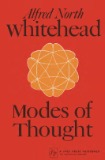Modes of Thought
Resumen
AI researchers often referencing Alfred North Whitehead's book "Modes of Thought" in an attempt too explain thought, consciousness, and reasoning. Whitehead's writings suggests that thought has quality of being both conditional and discrete. These two qualities are coveted in AI programming.
Whitehead starts by discussing the topics of "Interest and Importance". He covers the topics of interest and importance. Interest drives importance, as either exciters or inhibitors.
One becomes interested in his environmental factors and this interest activates a conditional response. To the observer, he believes this process is called thinking, but is following a series of behavioral responses and conditioned beliefs. The outcome of these conditions can be represented by a graph of possible paths. Disbelief is the pruning of certain paths that are dependant on the environmental factors. Consciousness seems to be the awareness or intuition too believe in ones conclusions or disbelieve. Consciousness creatively adds or subtracts conditional states in a person belief tree.
The interaction of these states generates discrete and predictable behavior and the observer concludes intelligence is emerging. In reality the system is a series of augmented finite state machines running their algorithms.
Interest and importance are the primary reasons for effort after exact discrimination of the sense data. For example, the motion of cars approaching an intersection is the conditioned by signals. The driver watches signals to determine exist lanes, when to stop, the rate of speed, merging into adjacent lanes, and travel spacing. The traffic signals are the outcome of the traffic. Stop lights are added to busy intersection to manage the flow of traffic and reduce confusion on turn taking at the intersection, car pool lanes encourage conservation by consolidation, and large digital messages forewarn of pending changes in traffic flow or detours information. Importance generates interest. Interest leads to discrimination. Finally consciousness develops and gradually and fitfully becomes another agent of stimulation. Consciousness is a human and divine quality. Consciousness is necessary for abstraction and abstraction necessary for proven theorms. Can a machine dream? Can a machine see the future? Can a machine feel? Of course not. A machine is no more conscious than a rock in your garden.
Whitehead focuses on the importance of language and usage of language for expression. Feelings are the comprehension is the reception of expression. Language is the triumph of human ingenuity. Language can be both oral and written and the distinction difficult to distinguish. The greatest invention in the past century was the printing press. Today the Internet replaces the printing press and introduces digital publishing as the modern means of communication. Expression tells of widespread intelligence. Voice is produced sound interpretation as natural symbols of human existence. Language is the expression of ones past into ones present. Language meaning presupposes the concrete relationship of real events happening and issuing from each other. Language is the systemization of expression. Human civilization is the outgrowth of language.
A thought is a tremendous mode of excitement. However, it is a hopeless task to attempt to understand understanding. Understanding is limited by its finitude. As science grew, men shrank in their width of comprehension.
Science has failed to produce men of learning with sensitivities and appreciation of varieties of interest and of varieties of potentiality. The rise of objectivity dulled comprehension and defeated understanding. Instead of understanding man became more critical. It is impossible to prove through criticism. Proof is only possible through abstraction. Instead, objectivity created men of criticism and not men dedicated to abstraction and if civilization will survive then understanding is a prime necessity.
Understanding involves the notion of composition. If a thing can be composed, the understanding of it can be in reference to its factors. The second mode of thought is to treat the concept as one unity, whether or not is capable of analysis. Philosophy is the attempt to make manifest the fundamental evidence as the nature of things. However, philosophy is only as good as things being explored are self-evident. The natural realm of cause and effect is described as differential equations. Differential equations provide a purely mathematical explanation of gravity, force, torque, current, optics, and relativity.
Philosophy is only as good as the topics it explores are self-evident. Philosophy is the criticism of abstraction governing special modes of thought. Philosophy in the proper sense cannot be proven. Proof is in abstraction. So philosophy is either self evident or it is not philosophy. Philosophy can only argue that the existence of God is self evident. Certain truthes are self evident, such as, life, liberty, rights of property, and the pursuit of happiness. Philosophy can made explore and expound endlessly on these truthes. However, Philsophy does not have the capacity to prove the nonexistence of God because it can not abstract. Objectivity at best can only criticize those who believe in God and this criticism can be classified as "lacking understanding".
Colecciones
- Libgen [81666]

